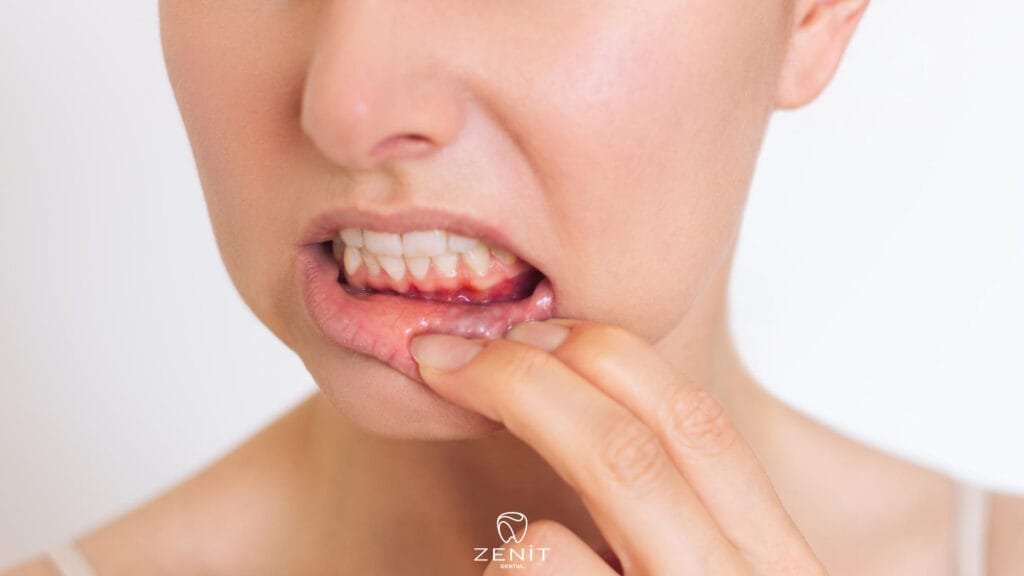Gums Randomly Bleeding Without Brushing
Gum bleeding is commonly associated with the sensitivity of the gums and is a frequently encountered issue. This condition can be an indicator of serious dental health problems and should not be overlooked. Having a better understanding of gum bleeding, identifying its root causes, evaluating treatment options, and implementing preventive measures are crucial for maintaining overall dental health.
There can be various reasons for gum bleeding. One of the most common causes is the accumulation of bacterial plaque, leading to gum inflammation. When plaque builds up around the gums, it can cause inflammation, resulting in bleeding. Other factors contributing to gum bleeding may include hormonal changes, poor oral hygiene, vitamin deficiencies, gum injuries, or side effects of certain medications.”

In terms of treatment, it is important to identify the underlying cause of gum bleeding. A dentist can determine an appropriate treatment plan to control gum inflammation and treat the infection. Methods such as professional dental cleaning, removal of dental plaque, or antibiotic therapy may be utilized. Additionally, regular dental check-ups and cleanings are essential to maintain gum health.
The key to preventing gum bleeding lies in practicing good oral hygiene. Regular brushing of teeth, using dental floss, and incorporating antimicrobial mouthwashes can reduce plaque buildup and prevent gum inflammation. Moreover, paying attention to a healthy diet with adequate intake of vitamins and minerals can positively impact gum health.
Causes of Gum Bleeding
- Plaque and Tartar Accumulation: The accumulation of plaque on teeth can harden over time, turning into tartar and potentially causing harm to the gums. Gum inflammation can result, leading to sensitivity and bleeding. Therefore, adopting regular brushing and dental cleaning habits is crucial in preventing plaque and tartar buildup and maintaining gum health.
- Brushing Errors: Brushing errors are also common causes of gum bleeding. Excessive use of a hard toothbrush or incorrect brushing techniques can irritate the gums and lead to bleeding. Learning the correct brushing techniques and using an appropriate brush are important for preserving gum health
- Gum Diseases: Gum diseases, such as gingivitis and periodontitis, are significant factors behind gum bleeding. These conditions arise when bacteria damage the gums. Early diagnosis and treatment of these diseases are critical for preserving gum health.
- Hormonal Changes: Hormonal changes, especially during periods like pregnancy and menopause, can affect the gums and lead to bleeding. Giving special attention to dental care during these periods can help minimize hormonal effects.
- Vitamin Deficiency: A deficiency in vitamin C can weaken the gums and cause bleeding. Maintaining a balanced diet to provide the body with necessary vitamins and minerals can positively impact gum health.
Preventive Measures for Gum Bleeding
- Regular Dental Check-ups: Dentists assess the condition of the gums during biannual check-ups, identifying and initiating treatment for potential issues that can be detected at an early stage. These check-ups also include preventive practices such as dental cleaning, contributing significantly to maintaining gum health.
- Correct Brushing Techniques: Adopting proper brushing techniques is an effective step in reducing gum bleeding. Emphasizing the importance of cleaning plaque and bacteria without causing harm to the gums, using the right brushing techniques, toothbrush softness, and incorporating dental floss positively impact gum health.
- Balanced Nutrition: A balanced diet is another factor that supports gum health. A nutrition-rich in vitamins and minerals can strengthen gums, support the immune system, and help reduce the risk of infection. Vitamin C, in particular, is crucial for gum health.
- Stress Management: Avoiding stress can have a positive impact on overall health, including gum health. Stress is known to trigger gum issues. Engaging in relaxing activities, turning to methods like meditation or exercise to avoid stress, can be an effective preventive measure for maintaining gum health.
- Limiting Tobacco and Alcohol Use: Restricting the use of tobacco and excessive alcohol is also a habit that can negatively affect gum health. Reducing or quitting the use of these substances can significantly decrease the risk of issues such as gum bleeding.
Conclusion:
Gum bleeding can often be an indicator of a serious issue and should not be ignored. Healthy gums are a crucial indicator of overall oral health. The mentioned causes, treatment methods, and preventive measures encompass actions individuals can take to preserve gum health and reduce bleeding issues.
Understanding the underlying causes of gum bleeding is essential. Factors such as gum inflammation, plaque accumulation, or hormonal changes can contribute to this problem. However, each individual’s situation is unique, making it imperative to consult with a dentist to create an effective treatment plan.
Your dentist will assess your gum health and recommend appropriate treatment methods. Interventions like professional dental cleaning, removal of dental plaque, or gum surgery can help control gum bleeding. Additionally, regular check-ups with your dentist can enable early detection of issues and implementation of preventive measures.
Home care measures are also of great importance. Maintaining daily routines such as brushing your teeth, using dental floss, and mouthwash regularly are effective steps to preserve gum health. Additionally, adopting healthy dietary habits, quitting smoking, and avoiding stress can help reduce gum problems.
It should be noted that regular dental care and check-ups are fundamental measures for a healthy mouth. Therefore, following the recommendations of your dentist and attending regular check-ups are key to maintaining long-term gum health. As each individual’s gum health is unique, seeking professional guidance to create a personalized care plan is crucial. Remember that a healthy smile is a reflection of your overall health.
Gums Randomly Bleeding Without Brushing Gums Randomly Bleeding Without Brushing Gums Randomly Bleeding Without Brushing Gums Randomly Bleeding Without Brushing Gums Randomly Bleeding Without Brushing Gums Randomly Bleeding Without Brushing Gums Randomly Bleeding Without Brushing Gums Randomly Bleeding Without Brushing Gums Randomly Bleeding Without Brushing Gums Randomly Bleeding Without Brushing Gums Randomly Bleeding Without Brushing Gums Randomly Bleeding Without Brushing Gums Randomly Bleeding Without Brushing







